般疑问句以及肯定句否定句练习题
英语肯定句、否定句、一般疑问句和特殊疑问句的讲解与练习
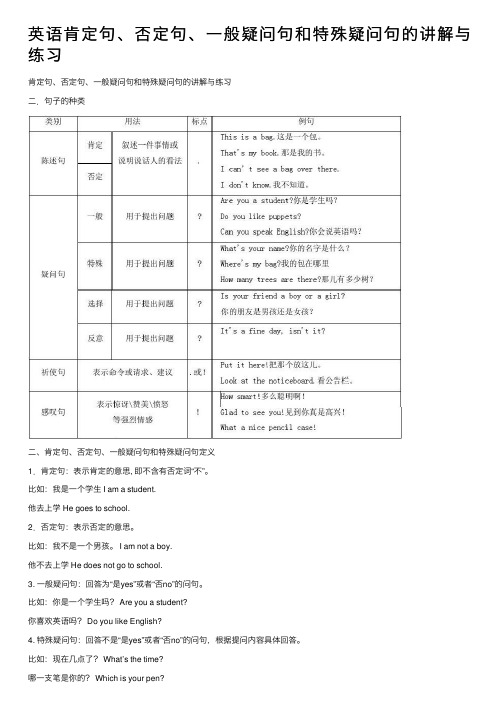
英语肯定句、否定句、⼀般疑问句和特殊疑问句的讲解与练习肯定句、否定句、⼀般疑问句和特殊疑问句的讲解与练习⼆.句⼦的种类⼆、肯定句、否定句、⼀般疑问句和特殊疑问句定义1.肯定句:表⽰肯定的意思, 即不含有否定词“不”。
⽐如:我是⼀个学⽣ I am a student.他去上学 He goes to school.2.否定句:表⽰否定的意思。
⽐如:我不是⼀个男孩。
I am not a boy.他不去上学 He does not go to school.3. ⼀般疑问句:回答为“是yes”或者“否no”的问句。
⽐如:你是⼀个学⽣吗? Are you a student?你喜欢英语吗? Do you like English?4. 特殊疑问句:回答不是“是yes”或者“否no”的问句,根据提问内容具体回答。
⽐如:现在⼏点了? What’s the time?哪⼀⽀笔是你的? Which is your pen?三、肯定句、否定句、⼀般疑问句和特殊疑问句的相互转换肯定句变否定句:在am, is, are 后⾯加上not,其余按顺序照抄。
肯定句变⼀般疑问句:把am, is, are 提前放到句⾸并⼤写Am, Is, Are,其余照抄。
肯定句变特殊疑问句(就划线部分提问):分3步骤第⼀步:先变⼀般疑问句。
第⼆步:找合适的特殊疑问词代替划线部分。
第三步:特殊疑问词提前放到句⾸,并⼤写,其余按顺序照抄,省略划线部分。
注意:1.如:Liming 's not here today. Who's not here today? 今天谁没来?2.划线部分不能在特殊疑问句中出现。
1.肯定句、否定句和⼀般疑问句的互换肯定句:否定句:⼀般疑问句:肯定回答:Yes, it is.否定回答:No, it isn’t.2.就划线部分提问(变特殊疑问句)This is a book.第⼀步:变⼀般疑问句 Is this a book?第⼆步:找合适的特殊疑问词 Is this what ?What is this?do not或者does not,其余按顺序照抄动词⽤原形。
小学英语一般疑问句和特殊疑问句(附练习题)
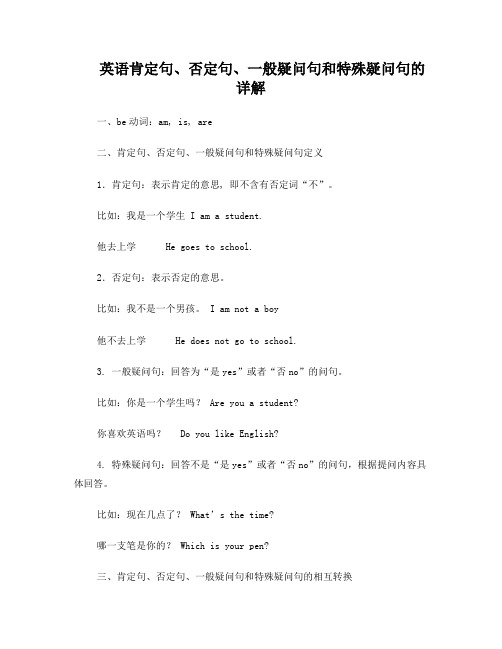
英语肯定句、否定句、一般疑问句和特殊疑问句的详解一、be动词:am, is, are二、肯定句、否定句、一般疑问句和特殊疑问句定义1.肯定句:表示肯定的意思, 即不含有否定词“不”。
比如:我是一个学生 I am a student.他去上学 He goes to school.2.否定句:表示否定的意思。
比如:我不是一个男孩。
I am not a boy他不去上学 He does not go to school.3. 一般疑问句:回答为“是yes”或者“否no”的问句。
比如:你是一个学生吗? Are you a student?你喜欢英语吗? Do you like English?4. 特殊疑问句:回答不是“是yes”或者“否no”的问句,根据提问内容具体回答。
比如:现在几点了?What’s the time?哪一支笔是你的? Which is your pen?三、肯定句、否定句、一般疑问句和特殊疑问句的相互转换有am, is, are的句子,肯定句变否定句:在am, is, are后面加上not,其余按顺序照抄。
肯定句变一般疑问句:把am, is, are提前放到句首并大写Am, Is, Are,其余照抄。
肯定句变特殊疑问句(就划线部分提问):分3步骤第一步:先变一般疑问句第二步:找合适的特殊疑问词代替划线部分第三步:特殊疑问词提前放到句首,并大写,其余按顺序照抄,省略划线部分。
注意:1.一定先变一般疑问句。
但是,如果问的是主语或主语的定语时,语序不变,为"特殊疑问词(+主语)+陈述句"。
如:Li ming 's not here today. Who's not here today? 今天谁没来?2.划线部分不能在特殊疑问句中出现。
when 什么时间(问时间)what date 什么日期问具体日期who 谁(问人)what place什么地点问具体地址whose 谁的问主人how …怎么样问情况where 在哪里问地点how old 多大问年龄which 哪一个问选择how many 多少问数量例如:1.肯定句、否定句和一般疑问句的互换肯定句:This is a book.否定句:This is not a book.一般疑问句:Is this a book?肯定回答:Yes, it is.否定回答:No, it isn’t.2.就划线部分提问(变特殊疑问句)This is a book.第一步:变一般疑问句 Is this a book?第二步:找合适的特殊疑问词 Is this what ?第三步:特殊疑问词提前放到句首,并大写,其余按顺序照抄,省略划线部分。
一般疑问句否定句练习题
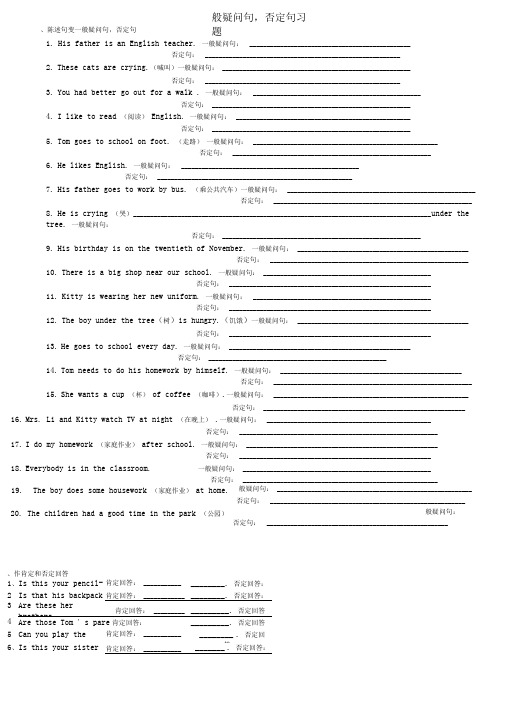
.否定回答:
特殊疑问句习题
一根据句意,特殊疑问词来完成句子。
13、Are you a good student肯定回答:_
What how whe n where
why
1.—do you go to school every day—On foot .
2.—did you go last ni ght—I went to the cin ema.
肯定回答:
.否定回答
4、
Are those Tom's pare肯定回答:
.否定回答
5、
Can you play the guitar
肯定回答:
.否定回答:
6、
Is this your sister
肯定回答:
.否定回答:
7、Is this my pen肯定回答:
8、Do you all(都、全部)at school肯定回答:
否定回答:
16、Can he play chess
肯定回答:
.否定回答:
17、May I ask your question
肯定回答:
.否定回答:
18、Do you like salad
肯定回答:
.否定回答:
9、Is he your father
肯定回答:
.否定回答
20、Are you from China.
般疑问句,否定句习题
、陈述句变一般疑问句,否定句
1.His father is an English teacher.一般疑问句:
否定句:
2.These cats are crying.(喊叫)一般疑问句:
否定句:
肯定句、否定句_一般疑问句
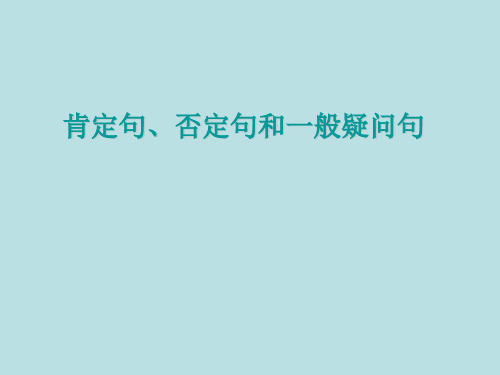
第一步:找
找 be动词、have、has、
如
找到了
情态动词
没找到
何 改
第二步:提
加 do
一
提句首(大写)
does
般
疑
第三步:改
问
①“句号”改“问号”
句
②如果有第一、第二
?
人称,则互改。
第四步:抄
其他照抄 一字不漏
肯定句、 否定句
和一般疑问句
基本概念
肯定句和否定句之间的转换 肯定句和一般疑问句之间的转换
肯定句和否定句之间的转换
1. 如果肯定句中有be动词(am, is, are, was, were)、助动词have、has, 或 情态动词(can, could, must,will 等) 直接+not即可得到相应的否定句。
Exercise
• My father is a taxi driver. → My father is not (isn’t) a taxi driver.
6. I wrote a letter to my uncle the day before yesterday. _____________________________________________
答案:Did you write a letter to my uncle the day before yesterday?
首页 上页 下页
• 3. There are many supermarkets in the city. _____ ____ _____supermarkets in the city?
答案:Are there many supermarkets in the city?
(完整)小学英语肯定句变否定句和一般疑问句类型(含答案).,推荐文档

肯定句改否定句和一般疑问句一、实义动词He often goes to bed at ten.We do eye exercises every day.She came to Japan in 1990.二、系动词I am your friend.Her mother is a teacher.There are two books on the desk. Yesterday was July 1, 1995. They were in Beijing in 1990.三、进行时The girl is standing at the station.The students are playing basketball on the playground.I am looking for a dog.四、情态动词Lucy will be back in four days.You can use this dictionary. You need go tomorrow.You should study hard..将下列陈述句变为否定句和一般疑问句1.He found his pen under his desk.2.We must go to the meeting right now.3.I wrote him a letter last week.4. My sister sings beautifully.5. Mary missed the bus.6. This bus will take you right to the city.7. They are doing questions and answers with the teachers.8. My father has his lunch at 11:30 everyday.9. There is a policeman at the corner of the road..10. Wang made some model ships for the boys.11.I saw somebody in the room just now.12. There is some wonderful news in todays paper.13. Xiao Li dropped the letter into the letter box.14. They are playing on the playground.15. Tom often tells them stories in French.16. After class some students play balls.17. Mary is reading newspaper now.18.I telephoned you yesterday.19.You have to go now.20.I have a house in the country.21. We did our homework together.22. They study for examination.23. We are talking about the film.24.I can go to the zoo today. 25.The first class begins at eight o ' clock.26.It takes you three hours to go to Paris by air.27.I reviewed my lessons yesterday.28.I ' ll go home by bus.29.He forgot to post the letter this morning.30.This room is going to be painted next week.肯定句变否定句和一般疑问句类型答案一、实义动词He often goes to bed at ten.f He does not ofte n go to bed at ten.f Does he ofte n go to bed ate n?We do eye exercises every day. T We don' t do eye exercises every day. f Do you do eye exercises every day? She came to Japan in 1990.t She did not come to Japan in 1990. t Did she come to Japan in 1990?二、系动词I am your friend.t I am not your friend.t Are you my friend?Her mother is a teacher.t Her mother is not a teachert Is her mother a teacher?There are two books on the desk.t There are not two books on the desk t Are there two books on the desk? Yesterday was July 1, 1995.t Yesterday was not July 1, 195.t Was yesterday July 1, 1995?They were in Beijing in 1990.f They were not in Beiji ng in 1990—Were they in Beiji ng in 1990?三、进行时The girl is standing at the station.f The girl is not standing at the station.f Is the girl standing at the station?The students are playing basketball on the playground.f The students are not playing basketball on the playground.f Are the students playing basketball on the playground?I am looking for a dog.f I am not looking for a dog.f Are you looking for a dog?He was writing letters at this time last night.f He was not writing letters at this time last night.f Was he writing letters at this time last night? We were having a meeting this time yesterday.f We were not having a meeting this time yesterday.f Were you having ameeting this time yesterday?四、情态动词Lucy will be back in four days.f Lucy will not be back in four days.f Will Lucy be back in four days?You can use this dictionary.f You can not use this dictionary.f Can I use this dictionary?You need go tomorrow.f You need not go tomorrow.f Need I go tomorrow?You should study hard.f You should not study hard..f should I study hard?将下列陈述句变为否定句和一般疑问句。
肯定句变否定句题型
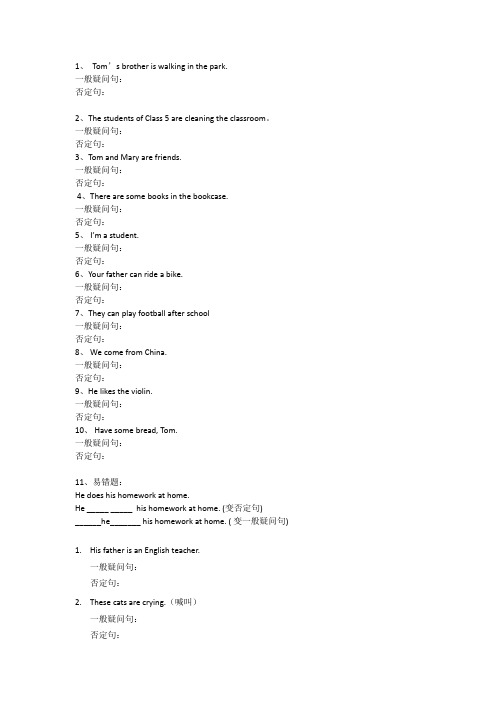
否定句:
5、I’m a student.
一般疑问句:
否定句:
6、Your father can ride a bike.
一般疑问句:
否定句:
7、They can play football after school
一般疑问句:
否定句:
8、We come from China.
一般疑问句:
1、Tom’s brother is walking in the park.
一般疑问句:
否定句:
2、The students of Class 5 are cleaning the classroom。
一般疑问句:
否定句:
3、Tom and Mary are friends.
一般疑问句:
否定句:
4、There are some books in the bookcase.
1.His father is an English teacher.
一般疑问句:
否定句:
2.These cats are crying.(喊叫)
一般疑问句:
否定句:
3.You had better go out for a walk .
一般疑问句:
否定句:
4.I like to read(阅读)English
否定句:
9、He likes the violin.
一般疑问句:
否定句:
10、Have some bread, Tom.
一般疑问句:
否定句:
11、易错题:
He does his homework at home.
He _____ _____ his homework at home. (变否定句)
3肯定句、否定句,疑问句
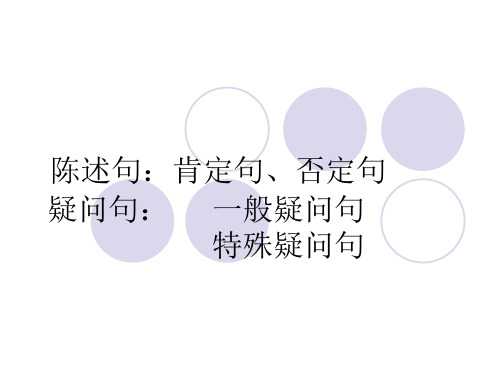
一般疑问句的肯定,否定回答: 肯定回答: Yes, 主(代词)+ be动词/情/助. 否定回答:No, 主(代词)+ be动词/情/助+not.
1、答语和dent? 肯:Yes ,I am. 否:No, I’m not. 2) Is he Sam? 肯:Yes ,he is . 否:No, he isn’t. 3) Do they like Chinese? No, they don’t. 肯: Yes ,they do. 否: 4) Does she have a small mouth? Yes ,she does.否: 肯: No, she doesn’t.
He isn’t Tom.
2、句子中有can, 在can 后加not. He can swim. He can’t swim. I can play football. I can’t play football. We can speak English. We can’t speak English.
定义: 在be 动词 陈述一个事实或说明 (is,am,are,was,were) 一种情况,句末用句 点。陈述句分肯定句 助动词(do, does, did,), 和否定句。 情态动词(can)
后加not.
二、肯定句变一般疑问句
1、句子中有be, 把be 提到句首。 1)I am a student. Are you a student? 2) They are blue. Are they blue? 3) He is Sam. Is he Sam?
3、谓语动词是动词原形,在动词前加don’t.
1) I have a book. I don’t have a book. 2) They like Chinese. They don’t like Chinese. 3) We come from China. We don’t come from China.
小学英语一般疑问句和特殊疑问句(附练习题)
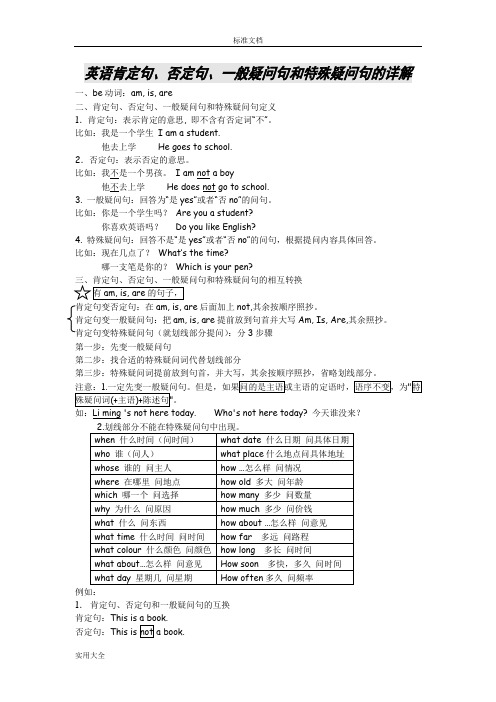
英语肯定句、否定句、一般疑问句和特殊疑问句的详解一、be动词:am, is, are二、肯定句、否定句、一般疑问句和特殊疑问句定义1.肯定句:表示肯定的意思, 即不含有否定词“不”。
比如:我是一个学生I am a student.他去上学He goes to school.2.否定句:表示否定的意思。
比如:我不是一个男孩。
I am not a boy他不去上学He does not go to school.3. 一般疑问句:回答为“是yes”或者“否no”的问句。
比如:你是一个学生吗?Are you a student?你喜欢英语吗?Do you like English?4. 特殊疑问句:回答不是“是yes”或者“否no”的问句,根据提问内容具体回答。
比如:现在几点了?What’s the time?哪一支笔是你的?Which is your pen?am, is, are后面加上not,其余按顺序照抄。
肯定句变一般疑问句:把am, is, are提前放到句首并大写Am, Is, Are,其余照抄。
:分3步骤第一步:先变一般疑问句第二步:找合适的特殊疑问词代替划线部分第三步:特殊疑问词提前放到句首,并大写,其余按顺序照抄,省略划线部分。
如:Li ming 's not here today.Who's not here today? 今天谁没来?例如:1.肯定句、否定句和一般疑问句的互换肯定句:否定句:一般疑问句:Is this a book?肯定回答:Yes, it is.否定回答:No, it isn’t.2.就划线部分提问(变特殊疑问句)This is a book.第一步:变一般疑问句Is this a book?第二步:找合适的特殊疑问词Is this what ?第三步:特殊疑问词提前放到句首,并大写,其余按顺序照抄,省略划线部分。
do not或者does not,其余按顺序照抄动词用原形肯定句变一般疑问句:在句首加do或者does并大写,其余照抄。
- 1、下载文档前请自行甄别文档内容的完整性,平台不提供额外的编辑、内容补充、找答案等附加服务。
- 2、"仅部分预览"的文档,不可在线预览部分如存在完整性等问题,可反馈申请退款(可完整预览的文档不适用该条件!)。
- 3、如文档侵犯您的权益,请联系客服反馈,我们会尽快为您处理(人工客服工作时间:9:00-18:30)。
一般疑问句以及肯定句否定句练习题
一、一般疑问句:特点:是以问号“?”结尾的
步骤:1、找出be动词(am, is , are)
2、be动词提前,放在句子开头,注意要改写成大写
3、其余部分照抄,但遇到my要改成your, I 要改成 you
(注意:you 只能跟are连)
一般疑问句的回答:分为两种,肯定回答和否定回答
肯定回答:Yes, it/she/he is. 或者Yes, I am.(视具体情况而定)
否定回答:No, it/she/he is not. 或者No, I am not.(视具体情况而定)
练习题:将下列句子改成一般疑问句并进行回答。
1、This is a pen.(否定回答)
2、This is my ruler.(否定回答)
3、She is Yang Ling.(否定回答)
4、It is an apple.(肯定回答)
5、I am Mike.(肯定回答)
二、否定句,是以句号“。
”结尾的
步骤 1、找出句子中的be(am ,is ,are)动词
2、在be动词后+“not”,其余照抄
否定句改为肯定句,只要将be动词后的”not”去掉练习题:将下列句子改成否定句或肯定句
1、T his is my pen.
2、T hat is your pencil.
3、I t is a ruler.
4、T his is not a pen.
5、S he is Yang Ling.。
